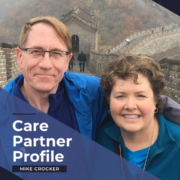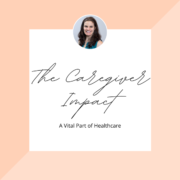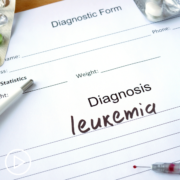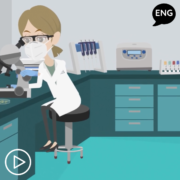Care Partner Profile: Mike Crocker
The first time Mike Crocker became a care partner was in 2016 when his wife Dr. Gerri Smoluk was diagnosed with Acute Myeloid Leukemia (AML). The second time was in 2020 when, after being in remission for four years, Gerri was diagnosed with leukemia again. The two experiences couldn’t have been more different, says Mike.
Gerri’s first diagnosis came shortly after she started a new job. Gerri, who had a PhD in biochemistry, worked in the pharmaceutical industry. She was feeling tired a lot, but she was brushing it off, blaming it on the stress that comes with a new job. However, Mike urged her to see a doctor, so Gerri had a coworker, who was also a doctor, check her out. The coworker sent Gerri directly to the emergency room. She was admitted and was in the hospital for 45 days undergoing chemotherapy. “She had a very severe case,” says Mike.
It was overwhelming to say the least, but Mike quickly took on the role of caregiver. He soon realized that the simple things were the most helpful. Mike made sure to bring Gerri some of the comforts of home. He made sure she had t-shirts and sweatshirts to wear instead of hospital gowns. He brought Gerri her laptop and yarn for crocheting. He brought her the few foods that she could actually taste after the chemo wiped out her taste buds. Mike was also her sounding board. He listened as she talked through her care options and how they would affect her quality of life. He was simply there for her, walking with her daily so she could get some exercise and maintain circulation, so she didn’t have to stay in bed with the compression sleeves on her legs. “I did all the little things that could help her be a little more in control and have as close to a normal day as possible,” says Mike adding that Gerri’s background in biochemistry and the pharmaceutical industry gave her unique insight into her care. “She started charting her tests and data so she could be a part of the solution and have informed discussions with doctors. She wanted details and wanted to know what to expect.”
Mike and Gerri learned that patients and care partners are given overwhelming amounts of information and that they have the responsibility of learning all they can and asking questions and making decisions. He says that doctors aren’t always keeping up with the latest research and that it is easy for them to get stuck in routine treatments. He found that doctors talk about options based on their experience and their skill set, but that doesn’t mean that approach is best for the patient. He says that being comfortable with the doctor and getting a second opinion if wanted are also important. He and Gerri learned to be active participants in her treatment and care.
In addition, Mike and Gerri were always looking ahead and focusing on the future. He concentrated on keeping her spirits up. When she was bald from chemo Gerri was looking at wigs and Mike says he encouraged her to go wild and get a bright red wig. “She didn’t go for it but being outrageous and adding humor to the moment was a way for me to help,” he says.
It was while she was in her fourth year of remission that Gerri found Patient Empowerment Network (PEN). “Gerri liked PEN’s focus on making the information understandable for patients, giving them easy-to-digest information to make decisions,” says Mike. Gerri jumped right in and helped to develop the Network Manager program which launched in March 2020. The program is made up of volunteers around the country who use their own patient experience to support patients and their care partners through their own cancer journey and on to a path to empowerment. “PEN is very important because it is patient-focused,” Mike says, and that’s why PEN appealed to Gerri. She liked that she could use her scientific background to help patients understand the information and to make sensible decisions for themselves. Gerri served as the AML Network Manager and was named a finalist for the 2020 Reuters Patient Champion Award in the Patient Advocate category.
Then in July 2020, Gerri got her second diagnosis. She celebrated her birthday July 7 and a week later, Gerri was back in the hospital. “This time she had a second type of leukemia which threw doctors for a loop,” says Mike. “Usually when leukemia patients relapse, it’s with the same type of leukemia.”
Although they had been through a leukemia diagnosis before, this experience was nothing like the first. “It was very different. It was during covid so of course, unlike before, when she could have friends drop in, she no longer could have visitors. Everything was more restrictive with covid,” says Mike. “At least I could be there every day.”
This time, Gerri and Mike were not expecting a longer hospital stay. They were expecting outpatient treatment that would be easier, and they were looking forward to time away from the hospital. The first time was so scary, but this time they were experienced, and they knew what to expect, but what they expected is not what happened.
After about a week Gerri got worse. Doctors were trying to figure out what was wrong, but they were unable to save her. Gerri died July 27, 2020. The autopsy revealed she had an antibiotic resistant bacterial infection.
More than a year later, Mike says he’s doing okay. “Everyone handles it differently,” he says. “You have to give yourself permission to not be happy and also give yourself permission to keep going and find other things to fill the hole.” In September 2021, he retired from his career as a web project manager, and recently he reached out to PEN looking for a way to use his skills to help others. “Gerri was the driver, so now I’ve been drifting,” he says. “That’s why I contacted PEN. I wanted to do something of value.”
Mike will be an invaluable addition to the PEN network of volunteers.
Jennifer Lessinger is a professional writer and editor who learned the value of patient empowerment during her struggle with a hard-to-diagnose and complex endocrine disorder.










